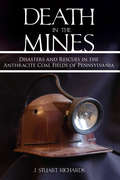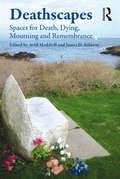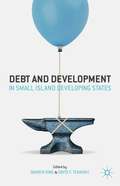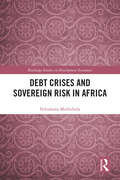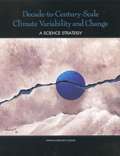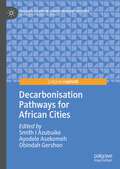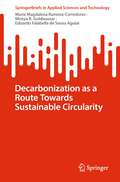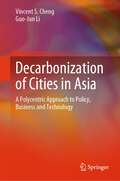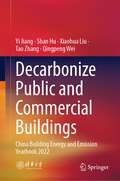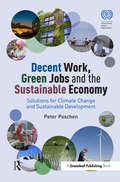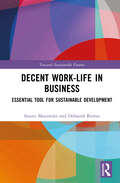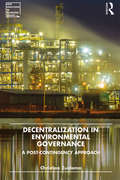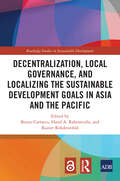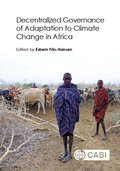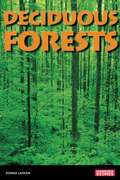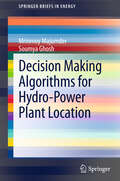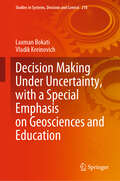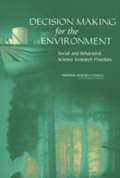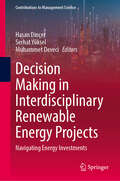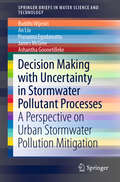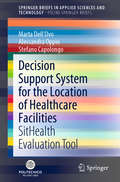- Table View
- List View
Death in the Mines: Disasters and Rescues in the Anthracite Coal Fields of Pennsylvania
by John Stuart RichardsVivid accounts of the dangers that miners faced on a daily basis in the northern, southern, and middle coal fields of eastern Pennsylvania. Since 1870, mining disasters have claimed the lives of over 30,000 men and boys who toiled underground in the anthracite mines of Pennsylvania. Sometimes they survived; many times they did not. The constant threat of fire, explosion, collapsed rock and deadly gas brought miners face to face with death on a daily basis. Through original journal and newspaper accounts, J. Stuart Richards’s Death in the Mines revisits Pennsylvania’s most notorious mining accidents and rescue attempts from 1869 to 1943. From the fire at Avondale Colliery that resulted in the first law for regulation and inspection of mines, to the gas explosion at Lytle Mine in Primrose that killed fourteen men, Richards reveals multiple facets of Pennsylvania’s most perilous profession. Richards, whose family has worked in the mines since 1870, offers a startling yet sensitive tribute to an industry and occupation that is often overlooked and underappreciated.
Death-Facing Ecology in Contemporary British and North American Environmental Crisis Fiction: Ecological Death-facing in Contemporary British and North American Fiction (Routledge Studies in Contemporary Literature)
by Louise SquireRecent years have seen a burgeoning of novels that respond to the environmental issues we currently face. Among these, Louise Squire defines environmental crisis fiction as concerned with a range of environmental issues and with the human subject as a catalyst for these issues. She argues that this fiction is characterized by a thematic use of "death," through which it explores a "crisis" of both environment and self. Squire refers to this emergent thematic device as "death-facing ecology". This device enables this fiction to engage with a range of theoretical ideas and with popular notions of death and the human condition as cultural phenomena of the modern West. In doing so, this fiction invites its readers to consider how humanity might begin to respond to the crisis.
Deathscapes: Spaces for Death, Dying, Mourning and Remembrance
by James D. SidawayDeath is at once a universal and everyday, but also an extraordinary experience in the lives of those affected. Death and bereavement are thereby intensified at (and frequently contained within) certain sites and regulated spaces, such as the hospital, the cemetery and the mortuary. However, death also affects and unfolds in many other spaces: the home, public spaces and places of worship, sites of accident, tragedy and violence. Such spaces, or Deathscapes, are intensely private and personal places, while often simultaneously being shared, collective, sites of experience and remembrance; each place mediated through the intersections of emotion, body, belief, culture, society and the state. Bringing together geographers, sociologists, anthropologists, cultural studies academics and historians among others, this book focuses on the relationships between space/place and death/ bereavement in 'western' societies. Addressing three broad themes: the place of death; the place of final disposition; and spaces of remembrance and representation, the chapters reflect a variety of scales ranging from the mapping of bereavement on the individual or in private domestic space, through to sites of accident, battle, burial, cremation and remembrance in public space. The book also examines social and cultural changes in death and bereavement practices, including personalisation and secularisation. Other social trends are addressed by chapters on green and garden burial, negotiating emotion in public/ private space, remembrance of violence and disaster, and virtual space. A meshing of material and 'more-than-representational' approaches consider the nature, culture, economy and politics of Deathscapes - what are in effect some of the most significant places in human society.
Debt And Development In Small Island Developing States
by Damien King David F. TennantDebt and Development in Small Island Developing States draws on the expertise of established researchers and public officials from within the SIDS community to answer the following pressing questions related to sustainability, debt accumulation, and prospects for future growth.
Debt Crises and Sovereign Risk in Africa (Routledge Studies in Development Economics)
by Ndzalama MathebulaThis book examines the resurgence of debt crises in Africa following the Covid-19 pandemic. It deciphers the debt crisis phenomenon through the discourse of sovereign risk, which has been paid insufficient attention within the African context. It seeks to appreciate facets that continue to lead African states to a debt-default position.The book focuses on the pre-stages of default and debt default risks. It explores and investigates whether South Africa was and continues to be financially capable of servicing its International Monetary Fund (IMF) loan, granted in 2020 for the COVID-19 pandemic. While investigating how and why Ethiopia and Ghana have already defaulted on their post-pandemic loans from the IMF. It examines the idea of sovereign risk in Africa through a qualitative methodology and a case study research design, analyzing three countries borrowed from the IMF in 2020 or later, mainly prompted by the pandemic. The book distinguishes between African states that have not yet defaulted and those that have already defaulted on their debt servicing. Namely, South Africa, Ethiopia, and Ghana, two of which have already defaulted on their loan. The book also notes the resurgence of the IMF within the African continent while assessing the past narrative and impact of the international monetary system and how it has changed in the post-pandemic era. However, economic diversification has been noted as a prominent remedy that holds the potential of strengthening African economies and aiding their eradication of the debt crisis.The book is designed to appeal to numerous reading communities, namely scholars, researchers, advanced students and policymakers.
Decade-to-Century-Scale Climate Variability and Change: A Science Strategy
by Panel on Climate Variability on Decade-to-Century Time ScalesSociety today may be more vulnerable to global-scale, long-term, climate change than ever before. Even without any human influence, past records show that climate can be expected to continue to undergo considerable change over decades to centuries. Measures for adaption and mitigation will call for policy decisions based on a sound scientific foundation. Better understanding and prediction of climate variations can be achieved most efficiently through a nationally recognized "dec-cen" science plan. This book articulates the scientific issues that must be addressed to advance us efficiently toward that understanding and outlines the data collection and modeling needed.
Decarbonisation Pathways for African Cities (Palgrave Studies in Climate Resilient Societies)
by Smith I Azubuike Ayodele Asekomeh Obindah GershonThis book examines the pathways to decarbonising African cities, structured around strategies and applications in renewable energy, waste management, healthcare, telecommunication, education and governance reconfigurations for Petro-cities. Throughout the book the authors highlight infrastructural, governance and policy approaches to drive decarbonisation. Opening with chapters focused on propositions for solar urban planning and scope for decarbonisation in waste management the book then moves on to examine innovative strategies for a low-carbon healthcare sector. The authors then discuss the use of hybrid power systems at remote telecommunication sites, their deployment on university campuses, and how this can be optimised to reduce carbon emissions. Further chapters explore government, private sector and civil society actions for decarbonising Kenyan cities and an overview of the political economic choices for decarbonising Petro-cities. Finally, closing chapters propose mechanisms for translating COP26 takeaways to decarbonisation policies and a low-carbon framework for African cities.
Decarbonization as a Route Towards Sustainable Circularity (SpringerBriefs in Applied Sciences and Technology)
by Maria Magdalena Ramirez-Corredores Mireya R. Goldwasser Eduardo Falabella de Sousa AguiarThis book surveys the current research on CO2 conversion processes and shows that these can close the carbon cycle as part of a circular economy. The technical and economic feasibility of these processes are examined together and current scientific challenges are signposted, which will guide future R&D. Technology sustainability is key for meeting and keeping decarbonization goals in the long term. However, considering economic and environmental sustainability individually is not enough. An integral view of sustainability that incorporates an energy term in the equation is needed. This book brings this concept to the fore.
Decarbonization of Cities in Asia: A Polycentric Approach to Policy, Business and Technology
by Vincent S. Cheng Guo-Jun LiThis book provides best practices for decarbonizing cities in East Asia, in which buildings are the major contributor to carbon emissions. Beyond the global commitment through the Paris Agreement to make collective efforts on climate action and accelerated policies, investment and development at the country and city level to combat climate change are occurring at an unprecedented rate. Rapid urbanization and increasing energy demand for large and dense Asian cities require smart and sustainable strategies to balance development with decarbonization. A poly-centric approach is needed, where a combination of policy-, market- and technology-driven changes can aid the transition towards development of carbon neutral cities. With practical examples in the implementation of the United Nations Sustainable Development Goals, green financing, climate action roadmap and policy, deployment of renewable energy, and low- to zero-carbon buildings, readers can find the motivation, considerations and implementation pathways to facilitate the transition into the new normal. It is the hope of the authors to encourage readers to see successful pathways in transitioning into a carbon-free industry and overcoming the effects of climate extremes.
Decarbonization or Demise – Sustainable Solutions for Resilient Communities: Selected Papers from the International Conference of Sustainable Ecological Engineering Design for Society (SEEDS) 2023
by Beth Jones Mohammad Dastbaz Christopher Gorse Colin Booth Lloyd Scott Darryl Newport Saheed Ajayi Leonie ParkinsonThe International Conference for Sustainable Ecological Engineering Design for Society (SEEDS) brings together experts from around the world to focus on changes required to minimize the impact of human activity on the environment. The research presented at the conference directly addresses the imperatives faced in addressing the climate crisis, whether through technological transformation, community collaboration, or resource management – all vital issues when changing and challenging practices within our built environment. The SEEDS Conference is designed to share the knowledge and experience needed to implement research and evidence-based societal change to respond to and address ecological and climate impacts.
Decarbonize Public and Commercial Buildings: China Building Energy and Emission Yearbook 2022
by Tao Zhang Xiaohua Liu Yi Jiang Shan Hu Qingpeng WeiOne of the key motivations and goals for China's social and economic development is the dual carbon target. Building is one of the most important sectors to reduce emissions and save energy, accounting for more than 20% of China's primary energy consumption and carbon emissions. This book analyzes the energy consumption of China's buildings sector in four categories, their characteristics and technologies to improve energy efficiency, and examines the greenhouse gas emissions of China's buildings, including building construction embodied emission and building operation emissions. In particular, this book discusses the ways to achieve carbon neutrality targets for China's public and commercial building sectors. This book also analyzes the energy mix, energy intensity, and technological prospects for achieving energy and carbon targets in the public and commercial building sectors. This book contains a large amount of survey data, monitoring data, and case studies. The debate on technologies and policies is underpinned by a variety of evidence and research that has been ongoing for more than a decade. The information, data, and policy recommendations will be of interest to a national and international audience working in the fields of energy, climate change, engineering, and building science.
Decent Work, Green Jobs and the Sustainable Economy: Solutions for Climate Change and Sustainable Development
by Peter PoschenThe challenges of achieving environmental sustainability and of generating decent work for all are closely linked. In this timely book, Poschen argues that an integrated approach to tackle these challenges is a necessity: the goal of environmentally sustainable economies will not be attained without the active contribution of the world of work. Decent Work, Green Jobs and the Sustainable Economy demonstrates that green jobs can be a key economic driver, as the world steps into the largely uncharted territory of building a sustainable and low-carbon global economy. Poschen shows that positive outcomes are possible, but require a clear understanding of the opportunities and challenges.Enterprises, workers and governments are not passive bystanders in the great transformation that is urgently needed in our economies. They are essential agents of change, able to develop new ways of working in sustainable enterprises that safeguard the environment, create decent jobs and foster social inclusion. This book highlights the solutions that the world of work offers for policy and practice to tackle climate change, achieve environmental sustainability and to build prosperous and cohesive societies. It is essential reading for those in business, academia and government.
Decent Work-Life in Business: Essential Tool for Sustainable Development (Towards Sustainable Futures)
by Debasish Biswas Soumi MajumderDecent Work-Life in Business: Essential Tool for Sustainable Development presents a detailed discussion of the concept of decent work-life and its application in business for sustainable development. It discusses decent work-life culture in a business environment. The book makes a strong case for decent work, which not only provides work opportunities but also delivers a fair income, fair treatment, security at the workplace, and social protection for families. With the help of empirical data and statistical indicators, it explores themes such as: ILO and decent work agenda opportunities for work and dignity at work social dimensions of globalization and sustainable development poverty reduction through decent work work-life balance and social protection unacceptable work and social dialogue economic and social context of decent work This book will be an indispensable resource for the students, scholars and teachers of business management and especially those pursuing a career in human resource management. It will also interest scholars of political economy, sociology of work, business management, human resource management, labour studies, public policy, and social anthropology alongside industry experts.
Decentralization in Environmental Governance: A post-contingency approach (New Directions in Planning Theory)
by Christian ZuidemaDecentralization in Environmental Governance is a critical reflection on the dangers and risks of governance renewal; warning against one-sided criticism on traditional command and control approaches to planning. The book formulates the arguments that support when and how governance renewable might be pursued, but this attempt is not just meant for practitioners and scholars interested in governance renewal. It is also useful for those interested in the challenge of navigating a plural landscape of diverse planning approaches, which are each rooted in contrasting theoretical and philosophical positions. The book develops a strategy for making argued choices between alternative planning approaches, despite their theoretical and philosophical positions. It does so by revitalizing the idea that we can contingently relate alternative planning approaches to the circumstances encountered. It is an idea traced to contingency studies of the mid and late 20th century, reinterpreted here within a planning landscape dominated by notions of uncertainty, complexity and socially constructed knowledge. This approach, called ‘Post-contingency’, is both a theoretical investigation of arguments for navigating the theoretical plurality we face and an empirical study into renewing environmental governance. Next to its theoretical ambitions, Decentralization in Environmental Governance is practical in offering a constructive critique on current processes of governance renewal in European environmental governance.
Decentralization, Local Governance, and Localizing the Sustainable Development Goals in Asia and the Pacific (Routledge Studies in Sustainable Development)
by Bruno Carrasco, Hanif A. Rahemtulla, and Rainer RohdewohldSince its adoption in 2015, the 2030 Agenda on Sustainable Development has shaped not only international development cooperation but also the design of national trajectories for social and economic development. In tandem with other global agendas adopted that year (such as the Paris Agreement on Climate Change and UN Habitat’s New Urban Agenda) it remains the global and regional blueprint for sustainable development despite the COVID-19 pandemic. The term "localizing the Sustainable Development Goals (SDGs)" has been used to capture the importance of subnational governments for achieving national SDG agendas. However, there is little deeper analysis of the required nexus between fiscal, political, and legal arrangements for SNGs; their involvement in national policy arenas (which discuss and decide on national SDG strategies); and the need for locally disaggregated data systems on the one hand, and effective SDG localization strategies on the other hand. It is this aspect which the present publication explores in greater detail by using country examples and conceptual analyses. The text will be of interest to policymakers, scholars, students and practitioners in public policy and public administration, decentralization, and sustainable development, with a focus on the Asia and Pacific region. The Open Access version of this book, available at www.taylorfrancis.com, has been made available under a Creative Commons Attribution-Non-Commercial-No Derivative License (CC BY-NC-ND 3.0 IGO).
Decentralized Governance of Adaptation to Climate Change in Africa
by Esbern Friis-Hansen Charles Aben Professor Jacob Agea Bernard Bashaasha Sarah Ann D'Haen Mikkel Funder Carol Mweemba Isaac Nakendo Jonas Østergaard Nielsen Professor Imasiku Nyambe James Okiror Julie Fogt Rasmussen Godfrey SuubiTwo perspectives have dominated the social science discourse on climate change adaptation. Firstly, an international narrative among UN and donor agencies of technical and financial support for planned climate change adaptation. Secondly, a significant volume of studies discuss how local communities can undertake their own autonomous adaptation. Effective and sustainable climate adaptation requires a third focus: understanding of the political processes within sub-national institutions that mediate between national and local practices. This book address the knowledge gap that currently exists about the role of district-level institutions in Sub-Saharan Africa in providing an enabling institutional environment for rural climate change adaptation. Key Features: · Analyses the disconnect between national and local policy and practice, and how to overcome it · Analysis of the political ecology of climate change adaptation in 10 diverse rural districts across Sub-Saharan Africa based on evidence from thorough field work · Explains how to improve the efficiency and effectiveness of climate change adaptation programmes by engaging with decentralized local governments and principles of subsidiarity with regards to decision-making and control over financial resources
Decentralized Governance of Adaptation to Climate Change in Africa
by Esbern Friis-HansenTwo perspectives have dominated the social science discourse on climate change adaptation. Firstly, an international narrative among UN and donor agencies of technical and financial support for planned climate change adaptation. Secondly, a significant volume of studies discuss how local communities can undertake their own autonomous adaptation. Effective and sustainable climate adaptation requires a third focus: understanding of the political processes within sub-national institutions that mediate between national and local practices. This book address the knowledge gap that currently exists about the role of district-level institutions in Sub-Saharan Africa in providing an enabling institutional environment for rural climate change adaptation. Key Features: #65533; Analyses the disconnect between national and local policy and practice, and how to overcome it #65533; Analysis of the political ecology of climate change adaptation in 10 diverse rural districts across Sub-Saharan Africa based on evidence from thorough field work #65533; Explains how to improve the efficiency and effectiveness of climate change adaptation programmes by engaging with decentralized local governments and principles of subsidiarity with regards to decision-making and control over financial resources
Deciduous Forests
by Donna LathamInvestigating the planet's biomes and examining the modern threats to each ecosystem, this interactive series challenges young readers to look at how their own actions influence the planet's health. With compare-and-contrast facts and vocabulary-building sidebars, each engaging guide reveals how environmental threats-both human and natural-affect plants and animals.Showcasing the diverse woodland of deciduous forests, this resource reveals how many of its threats come from humans. Covering topics such as deforestation, acid rain, disease, and invasive species, this engaging guide shows how, in the complicated web of life in the forest, even natural threats can be made worse by human activity.
Decision Making Algorithms for Hydro-Power Plant Location
by Mrinmoy Majumder Soumya GhoshThe present study has attempted to apply the advantage of neuro-genetic algorithms for optimal decision making in maximum utilization of natural resources. Hydro-power is one of the inexpensive, but a reliable source of alternative energy which is foreseen as the possible answer to the present crisis in the energy sector. However, the major problem related to hydro-energy is its dependency on location. An ideal location can produce maximum energy with minimum loss. Besides, such power-plant also requires substantial amount of land which is a precious resource nowadays due to the rapid and uncontrolled urbanization observed in most of the urban centres in the World. The feasibility of such plants also depends on social acceptance as well as the level of environmental casualty and economic benefit, all of which is also spatially dependent. Decision making algorithms are applied to identify better solution if a problem has more than one alternative explication. Nature based algorithms are found to be efficient enough to catalyze such kind of decision making analysis. That is why the present study tries to utilize nature based algorithms to solve the problems of location selection for hydropower plants. The study employed six different types of nature based algorithms to select one of the locations among many available for installation of hydropower plant in the North Eastern part of the Indian subcontinent. The locations are selected based on their in stream resources and included in the decision making as alternatives. A methodology of criteria selection, determination of weightage and applications of bioinspired algorithms are adopted to produce utmost exertion of the available natural resources with minimum hostility and wastage of the same.
Decision Making Under Uncertainty, with a Special Emphasis on Geosciences and Education (Studies in Systems, Decision and Control #218)
by Vladik Kreinovich Laxman BokatiThis book describes new techniques for making decisions in situations with uncertainty and new applications of decision-making techniques. The main emphasis is on situations when it is difficult to decrease uncertainty. For example, it is very difficult to accurately predict human economic behavior, so in economics, it is very important to take this uncertainty into account when making decisions. Other areas where it is difficult to decrease uncertainty are geosciences and teaching. The book analyzes the general problem of decision making and shows how its results can be applied to economics, geosciences, and teaching. Since all these applications involve computing, the book also shows how these results can be applied to computing, including deep learning and quantum computing. The book is recommended to researchers, practitioners, and students who want to learn more about decision making under uncertainty—and who want to work on remaining challenges.
Decision Making for the Environment: Social and Behavioral Science Research Priorities
by National Research Council of the National AcademiesWith the growing number, complexity, and importance of environmental problems come demands to include a full range of intellectual disciplines and scholarly traditions to help define and eventually manage such problems more effectively. Decision Making for the Environment: Social and Behavioral Science Research Prioritiesis the result of a 2-year effort by 12 social and behavioral scientists, scholars, and practitioners. The report sets research priorities for the social and behavioral sciences as they relate to several different kinds of environmental problems.
Decision Making in Interdisciplinary Renewable Energy Projects: Navigating Energy Investments (Contributions to Management Science)
by Hasan Dinçer Serhat Yüksel Muhammet DeveciThis edited book presents a comprehensive analysis of the multidimensional aspects associated with decision making in renewable energy investment projects. It delves into the interplay between interdisciplinary studies, sustainability considerations, and circular economy principles within the renewable energy sector. By examining the impact of these interconnected domains, the book offers valuable insights into the challenges and opportunities inherent in decision making for renewable energy investments. The book is tailored to a diverse audience, including researchers, scholars, and professionals in the fields of renewable energy, sustainability, circular economy, and business management. It is equally suitable for graduate and undergraduate students studying environmental studies, renewable energy, sustainability, and related disciplines. Professionals working in the renewable energy industry, including project developers, investors, and policymakers, will find valuable insights to inform their decision-making processes. Additionally, engineers, economists, social scientists, and environmental consultants interested in interdisciplinary studies and their intersection with renewable energy will benefit from the book's comprehensive analysis.
Decision Making with Uncertainty in Stormwater Pollutant Processes: A Perspective on Urban Stormwater Pollution Mitigation (SpringerBriefs in Water Science and Technology)
by An Liu Ashantha Goonetilleke Prasanna Egodawatta Buddhi Wijesiri James McGreeThis book presents new findings on intrinsic variability in pollutant build-up and wash-off processes by identifying the characteristics of underlying process mechanisms, based on the behaviour of various-sized particles. The correlation between build-up and wash-off processes is clearly defined using heavy metal pollutants as a case study. The outcome of this study is an approach developed to quantitatively assess process uncertainty, which makes it possible to mathematically incorporate the characteristics of variability in build-up and wash-off processes into stormwater quality models. In addition, the approach can be used to quantify process uncertainty as an integral aspect of stormwater quality predictions using common uncertainty analysis techniques. The information produced using enhanced modelling tools will promote more informed decision-making, and thereby help to improve urban stormwater quality.
Decision Science for Future Earth: Theory and Practice
by Tetsukazu YaharaThis open access book provides a theoretical framework and case studies on decision science for regional sustainability by integrating the natural and social sciences. The cases discussed include solution-oriented transdisciplinary studies on the environment, disasters, health, governance and human cooperation. Based on these case studies and comprehensive reviews of relevant works, including lessons learned from past failures for predictable surprises and successes in adaptive co-management, the book provides the reader with new perspectives on how we can co-design collaborative projects with various conflicts of interest and how we can transform our society for a sustainable future. The book makes a valuable contribution to the global research initiative Future Earth, promoting transdisciplinary studies to bridge the gap between science and society in knowledge generation processes and supporting efforts to achieve the UN’s Sustainable Development Goals (SDGs). Compared to other publications on transdisciplinary studies, this book is unique in that evolutionary biology is used as an integrator for various areas related to human decision-making, and approaches social changes as processes of adaptive learning and evolution. Given its scope, the book is highly recommended to all readers seeking an integrated overview of human decision-making in the context of social transformation.
Decision Support System for the Location of Healthcare Facilities: SitHealth Evaluation Tool (SpringerBriefs in Applied Sciences and Technology)
by Stefano Capolongo Alessandra Oppio Marta Dell'OvoThe book examines an integrated approach for addressing decisions about the location of healthcare facilities. Supported by Geographic Information Systems (GIS) and Multi-Criteria Decision Analysis (MCDA), the approach provides comprehensive information on territory, taking into account the spatial dimensions. Due to the multiple criteria involved, site selection for urban facilities is a crucial topic in planning decision processes, especially for healthcare facilities. Healthcare provision policies generally fail to address the distribution of facilities within cities, entrusting decisions to various stakeholders. Moreover current evaluation tools focus on the intrinsic performances of healthcare structures, disregarding the extrinsic characteristics, namely those related to the location. Starting with a cross-disciplinary literature review, the book describes a multi-methodological approach for decision-making regarding the location of healthcare facilities, and presents an innovative evaluation tool that simultaneously considers functional, locational, environmental and economic issues, providing a comprehensive overview of the areas under investigation.
